
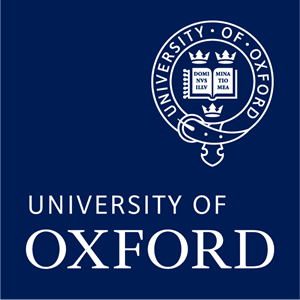
I am delighted that you have expressed an interest to work with our People teams and colleagues at the University of Oxford. In the aftermath of Covid-19 the cost-of-living crisis, organisations are facing historic challenges with a competitive talent landscape, an exhausted workforce and added pressures to control costs. Traditional work models no longer meet the needs of the workforce and employees now require access to the relevant information and technology for their jobs, wherever and however they choose to work. Looking within our University, we face similar challenges and are working in partnership with our People professionals across the Divisions and Colleges to understand the changing needs of our workforce and labour market. The successful Director of Talent will play an integral role in helping the collegiate University to rise to these challenges by retaining, developing, attracting and rewarding world-class talent, embedding a strategic workforce planning approach and changing culture and working practices through inclusive Organisational Development and Learning and Development.
The main thing that has struck me since I joined the University in September 2022 is everyone’s genuine commitment to creating an inclusive, diverse and values-driven culture in partnership with the HR professionals in the Colleges. We are already making strides towards achieving this. The Vice Chancellor’s Pay and Conditions Review is looking to ensure competitive and fair pay, reward and benefits, while the new Digital Transformation strategy will be essential in leveraging technology to achieve efficiencies in ways of working and improve our employee experience. We have also prioritised staff wellbeing (Thriving at Oxford) and flexible working (New Ways of Working) and are investing in skills development, career mobility and people development support. Planning is already underway for a new University Strategic Plan in 2024 complemented by a new People Strategy that will enable our University to continue to be a world leader in both research and education for the benefit of society, globally.
I look forward to engaging with you in this process and I would like to thank you for your interest once again.



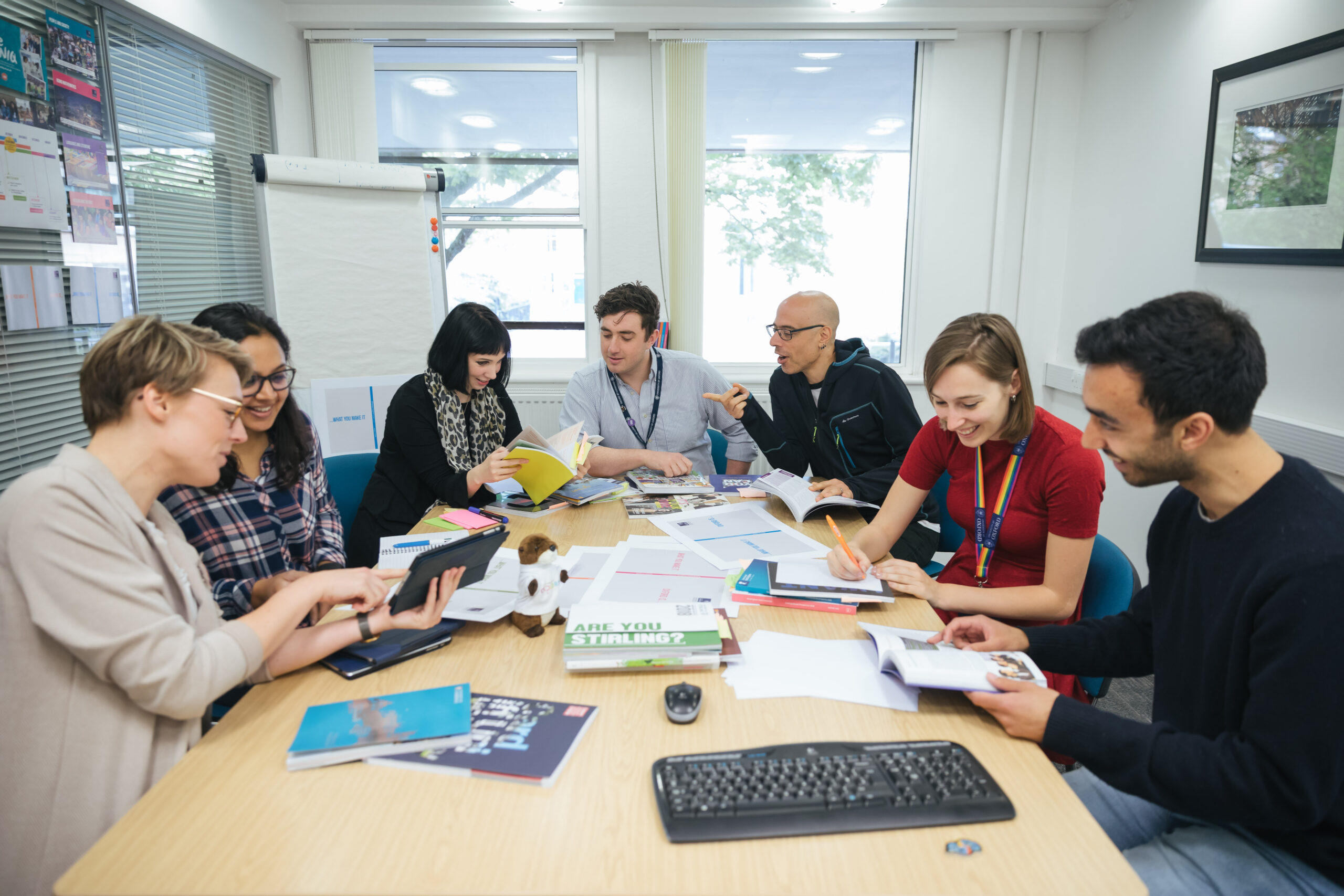

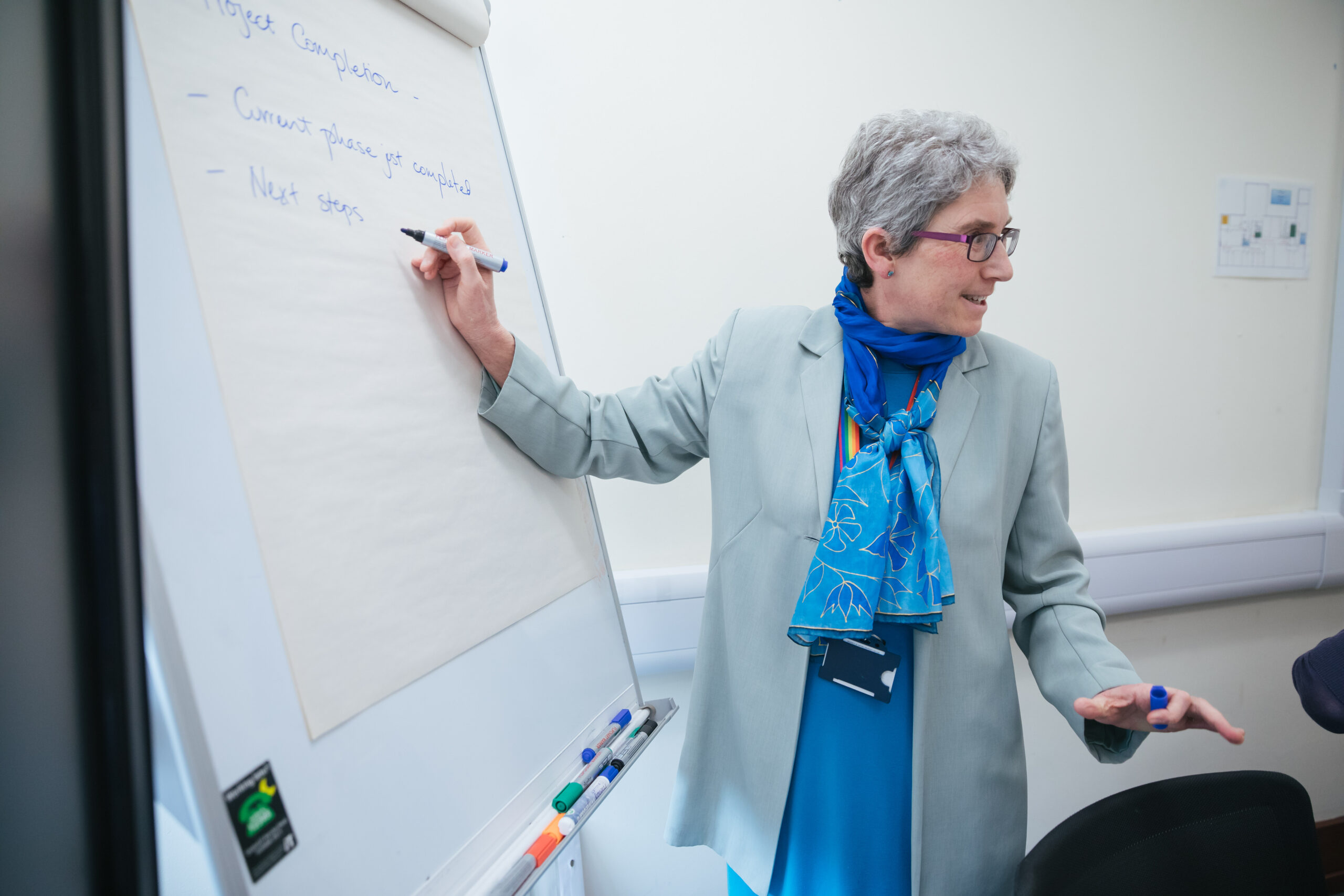

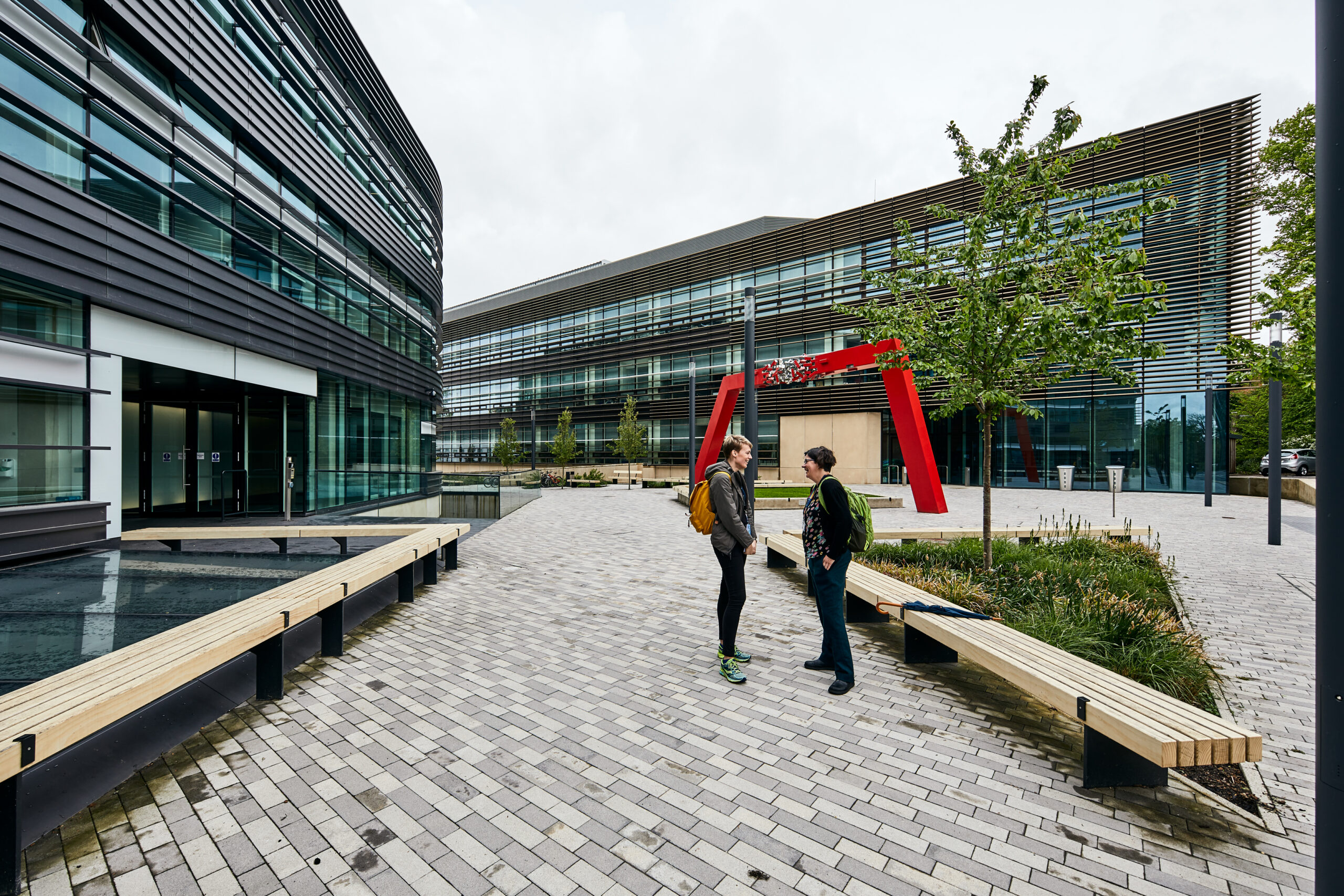




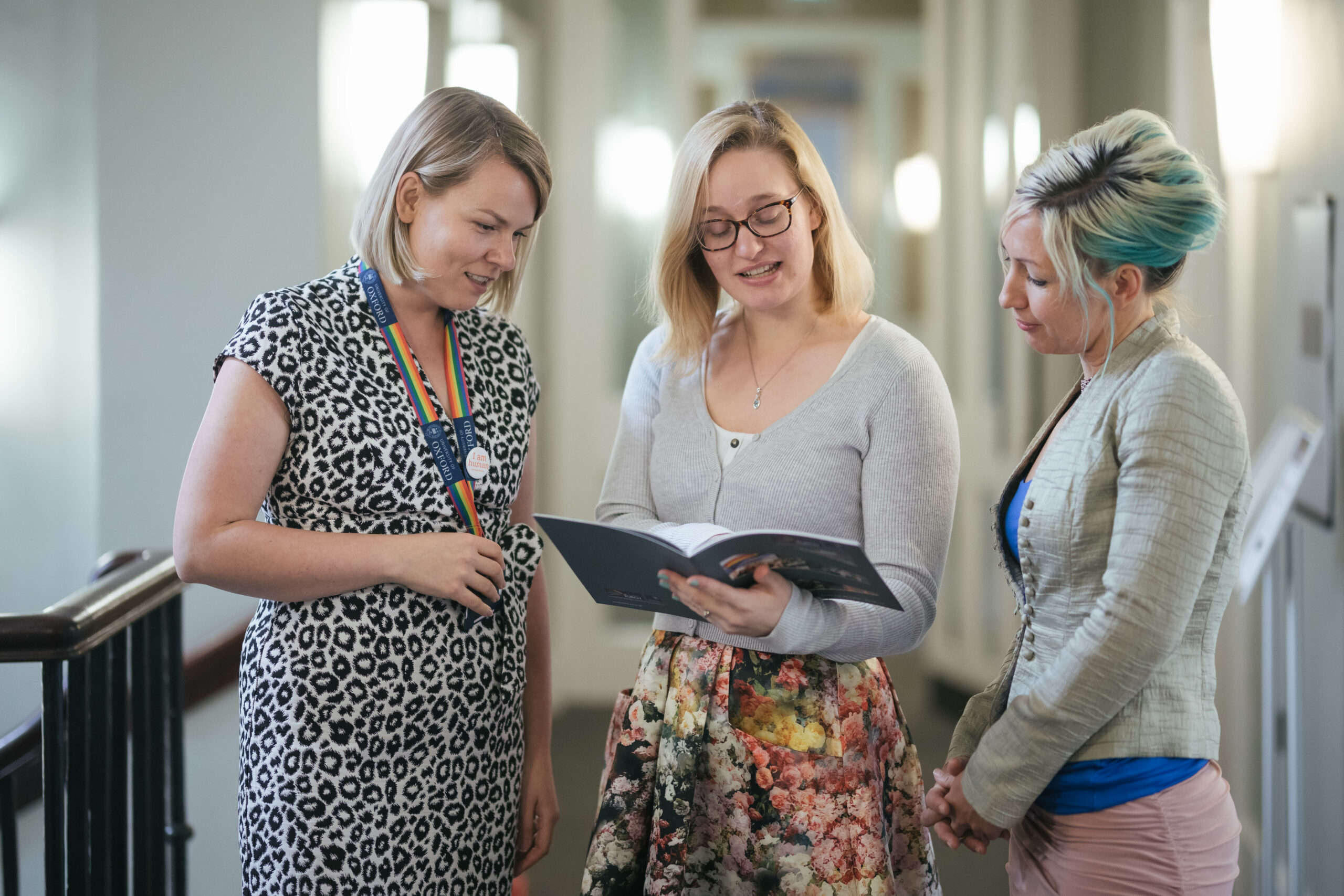










The University of Oxford
Welcome to the University of Oxford. We aim to lead the world in research and education for the benefit of society both in the UK and globally. Oxford’s researchers engage with academic, commercial and cultural partners across the world to stimulate high-quality research and enable innovation through a broad range of social, policy and economic impacts.
We believe our strengths lie both in empowering individuals and teams to address fundamental questions of global significance, while providing all our staff with a welcoming and inclusive workplace that enables everyone to develop and do their best work. Recognising that diversity is our strength, vital for innovation and creativity, we aspire to build a truly diverse community which values and respects every individual’s unique contribution.
While we have long traditions of scholarship, we are also forward-looking, creative and cutting-edge. Oxford is one of Europe’s most entrepreneurial universities. We rank first in the UK for university spin-outs, with more than 130 companies created to date. We are also recognised as leaders in support for social enterprise.
Join us and you will find a unique, democratic and international community, a great range of staff benefits and access to a vibrant array of cultural activities in the beautiful city of Oxford.
For more information, please visit: www.ox.ac.uk/about/organisation
Oxford is a world-leading centre of learning, teaching and research and the oldest university in the English-speaking world and can lay claim to nine centuries of continuous existence.
Academic divisions
There are four academic divisions within Oxford University. All have a full-time divisional head and an elected divisional board. Also listed are the University Administration Services (UAS), where this role sits, the Department for Continuing Education, and the University’s Gardens, Libraries and Museums.
Strategic Plan 2018-2024
The University Strategic Plan sets out a framework of priorities for the University, its divisions and departments. The Conference of Colleges has been consulted during the drafting of the plan and colleges will be vital partners in its implementation. The strategic plan will be underpinned by a more detailed implementation plan overseen by a programme board chaired by the Vice-Chancellor reporting to PRAC on a termly basis and, through it, to Council on an annual basis. The annual reports are also published on the University website (behind single sign-on).
Mission
The advancement of learning by teaching and research and its dissemination by every means.
Vision
We will work as one Oxford bringing together our staff, students and alumni, our colleges, faculties, departments and divisions to provide world-class research and education. We will do this in ways which benefit society on a local, regional, national and global scale. We will build on the University’s long-standing traditions of independent scholarship and academic freedom while fostering a culture in which innovation and collaboration play an important role.
We are committed to equality of opportunity, to engendering inclusivity, and to supporting staff and student wellbeing, ensuring that the very best students and staff can flourish in our community. We believe that a diverse staff and student body strengthens our research and enhances our students’ learning.
The University’s distinctive democratic structure, born of its history, will continue to offer a source of strength. Likewise Oxford’s collegiate structure provides the University with key aspects of its academic strength and its highly attractive student experience. Oxford will continue to foster the interdisciplinary nature of the colleges, their teaching strength, and their defining and enduring sense of community.
Learn more here.
A study carried out by London Economics – The Economic Impact of the University of Oxford – measured the University’s impact on the UK economy in 2018/19. It considers the impact of a range of University activities, including:
The report found that every £1 invested in University of Oxford research and knowledge exchange activities generated £10.30 to the wider UK economy.
The total impact in regions outside the South East was over £4 billion (38%), with impacts in excess of £100 million occurring in each region outside of the South East.
Oxford’s economic impact
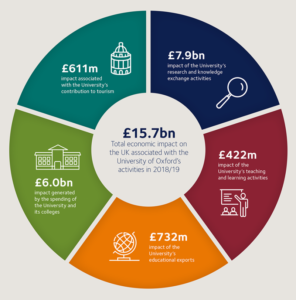
Impact of research, intellectual property, University spinouts, and science parks

University of Oxford’s Equality Policy
The University of Oxford is committed to fostering an inclusive culture which promotes equality, values diversity and maintains a working, learning and social environment in which the rights and dignity of all its staff and students are respected. We recognise that the broad range of experiences that a diverse staff and student body brings strengthens our research and enhances our teaching, and that in order for Oxford to remain a world-leading institution we must continue to provide a diverse, inclusive, fair and open environment that allows everyone to grow and flourish.
The University embraces diversity amongst its members and seeks to achieve equity in the experience, progression and achievement of all students and staff through the implementation of transparent policies, practices and procedures and the provision of effective support. It also seeks to ensure that its public engagement work and services benefit diverse audiences and communities.
The University recognises that equality and inclusion should be embedded in all its activities and seeks to promote awareness of equality and foster good practice. The University is committed to a programme of action to support its equality policy, to monitoring its effectiveness, and to publishing information on progress towards its equality aims.
The University seeks to ensure that no member of its community is unlawfully discriminated against on the basis of age, disability, gender reassignment, marital or civil partnership status1, pregnancy and maternity, race (including colour, nationality and ethnic or national origins), religion or belief (including lack of belief), sex, or sexual orientation (hereafter referred to as the ‘protected characteristics’).
In exercising its policies, practices, procedures and other functions, the University will have due regard to its duties under the Equality Act 2010 and to the protected characteristics, as well as other relevant circumstances including parental or caring responsibilities, contract type, and working hours.
The University will seek to make a positive contribution to the advancement of equality through all its activities. In particular, the University will:
Encourage applications for study and employment from the widest pool of potential candidates, especially where representation is disproportionately low, and take lawful positive action, for example with targeted scholarships, to improve diversity where appropriate.
Take appropriate steps to meet the particular needs of individuals from protected groups where these are different from the needs of others, and work to eliminate any barriers to their success.
In respect of students, seek to attract and admit students of outstanding potential whatever their background, and work to ensure that teaching and assessment provide an equal opportunity for all students to achieve and demonstrate their full academic potential. Decisions on the admission of students will be based solely on the individual merits of each candidate and the application of selection criteria appropriate to the course of study.
In respect of staff, seek to ensure that entry into employment and progression within employment are determined solely by criteria which are related to the duties of a particular post and the relevant grade; and support career development and progression with the aim of ensuring diverse representation and participation at all levels.
The University understands inclusion to mean institutional and individual efforts and actions to foster an environment and institutional culture in which each member feels, and is, valued, listened to and respected, able to be themselves and empowered to participate fully in the life of the University.
The University expects all members of the University community to treat each other with respect, courtesy and consideration and does not tolerate any form of unlawful discrimination, bullying, harassment or victimisation. It has a Policy on Harassment, which includes examples of unacceptable behaviour, supported by a Harassment Advisory Service.
Freedom of expression and academic freedom, as outlined in the University’s Statement on Freedom of Speech, are protected by law, and by the University’s statutes and policies, though these rights must be exercised within the law.
Learn more about the policy here.
Grade: TBC (provisionally ALC6)
Salary: £100,000 – £110,000
Division: University Administration and Services (UAS)
Department: HR
Reporting to: Director of Human Resources
JOB DESCRIPTION
As the Director of Talent, you will play a critical role in building and managing the talent development lifecycle strategy for the university. You will be responsible for leading the teams of Resourcing, Organisational Learning and Development, Workforce Planning and Pay, Rewards and Benefits.
The post holder will work closely with the HR Director, be his deputy and represent the University’s HR community both internally and externally.
Main duties and responsibilities
Resourcing and workforce planning
Employer branding and candidate experience
Talent development and retention
Evidence based talent management
Team leadership
Senior leadership
PERSON SPECIFICATION
Essential criteria
Desirable criteria
UNIVERSITY BENEFITS
University Club and sports facilities
The University Club provides social, sporting and hospitality facilities. It incorporates a bar, café and sporting facilities, including a gym. Staff can also use the University Sports Centre on Iffley Road at discounted rates, including a fitness centre, powerlifting room, and swimming pool. Learn more about the club here and the sports facilities here.
Information for international staff (or those relocating from another part of the UK)
If you are relocating to Oxfordshire from overseas, or elsewhere in the UK, the University’s International Staff website includes practical information related to moving to and settling in Oxford such as advice on immigration, relocation, accommodation, or registering with a doctor. Learn more here.
The University of Oxford Newcomers’ Club
The University of Oxford Newcomers’ Club is an organisation run by volunteers that aims to assist the partners of new staff to settle into Oxford and to provide them with an opportunity to meet people in the area. Learn more here.
Childcare
The University has excellent childcare services with five University nurseries, as well as University-supported places at many other private nurseries. For full details, including how to apply and the costs, click here.
Family-friendly benefits
The University subscribes to My Family Care and staff are eligible to register for emergency back-up childcare and adultcare services, a ‘speak to an expert’ phone line and a wide range of guides and webinars through a website called the Work + Family space.
Disabled staff
We are committed to supporting members of staff with disabilities or long-term health conditions. Please visit here for further details, including information about how to make contact, in confidence, with the University’s Staff Disability Advisor.
Staff networks
The University has a number of staff networks including the Oxford Research Staff Society, BME staff network, LGBT+ staff network and a disabled staff network. You can find more information here.
USS Pensions Hub
The Universities Superannuation Scheme (USS) – a national pension scheme open to staff in academic or comparable posts in a number of universities. Learn more here.
Annual leave
We have a number of generous benefits including 38 days’ annual leave (inclusive of bank holidays and fixed closure days), generous pension schemes and free access to the Oxford colleges.
Other benefits
Staff can enjoy a range of other benefits such as free visitor access to the University’s colleges and the Botanic Gardens as well as a range of discounts. Learn more here.
IMPORTANT INFORMATION FOR CANDIDATES
Pre-employment screening
Please note that the appointment of the successful candidate will be subject to standard pre-employment screening, as applicable to the post. This will include right-to-work, proof of identity and references. We advise all applicants to read the candidate notes on the University’s pre-employment screening procedures, found here.
The University’s policy on retirement
The University operates an Employer Justified Retirement Age (EJRA) for all academic posts and some academic-related posts. From 1 October 2017, the University has adopted an EJRA of 30 September before the 69th birthday for all academic and academic-related staff in posts at grade 8 and above. The justification for this is explained here.
For existing employees, any employment beyond the retirement age is subject to approval through the procedures.
From 1 October 2017, there is no normal or fixed age at which staff in posts at grades 1–7 have to retire. Staff at these grades may elect to retire in accordance with the rules of the applicable pension scheme, as may be amended from time to time.
Equality of Opportunity
Entry into employment with the University and progression within employment will be determined only by personal merit and the application of criteria which are related to the duties of each particular post and the relevant salary structure. In all cases, ability to perform the job will be the primary consideration. No applicant or member of staff shall be discriminated against because of age, disability, gender reassignment, marriage or civil partnership, pregnancy or maternity, race, religion or belief, sex, or sexual orientation.
Anderson Quigley is acting as an advisor to the University; an executive search process is being carried out by Anderson Quigley in addition to the public advertisement.
The closing date for applications is noon on Wednesday 27th September.
Applications should consist of:
Should you wish to discuss the role(s) in strict confidence, please contact Kiersten Avery on kiersten.avery@andersonquigley.com or +44 (0)7510 384 735.